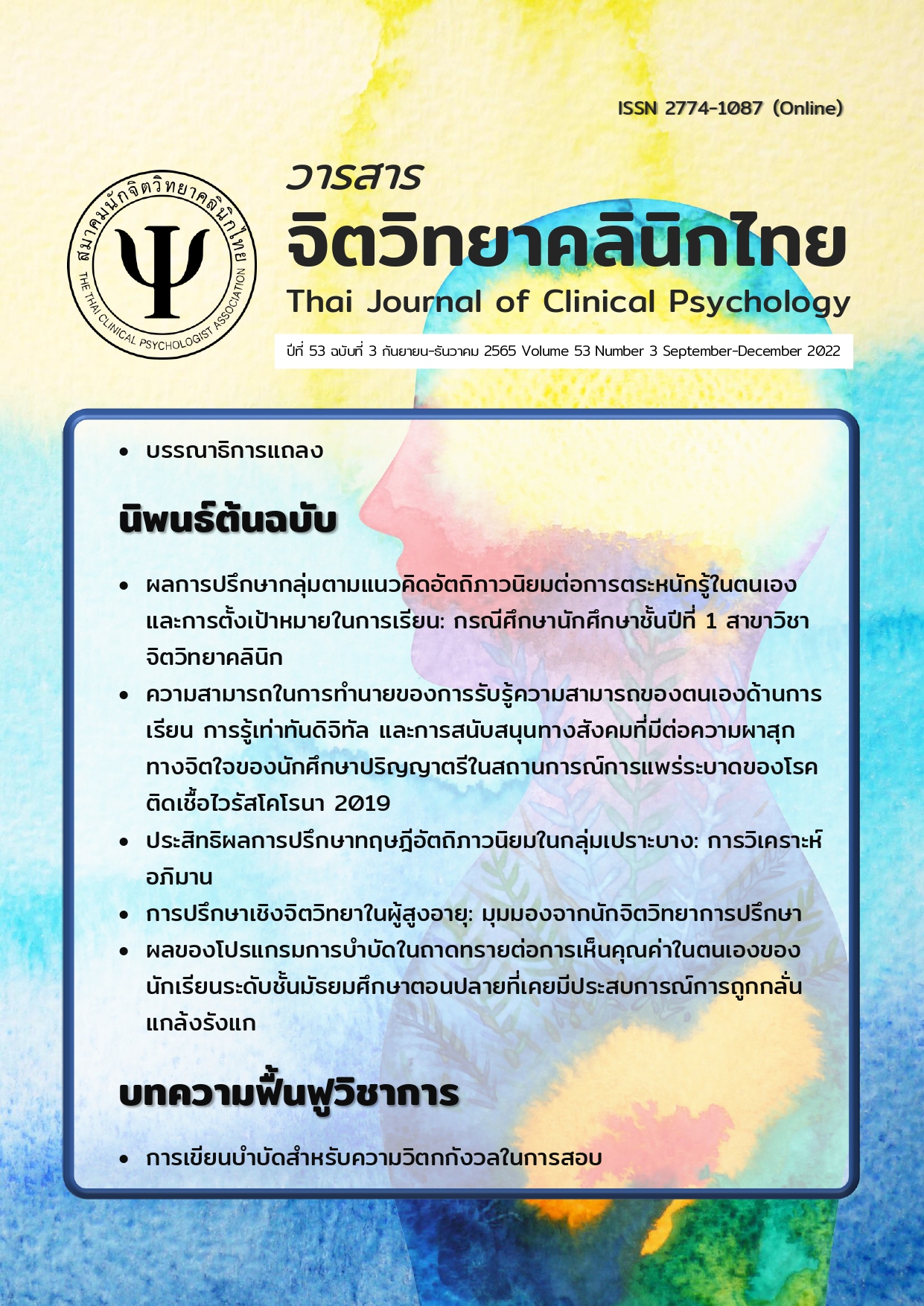Counseling Older Adults: Counselors' perspectives
Main Article Content
Abstract
Objectives:This study aims to explore counseling approach for older clients from the perspectives
of counseling psychologists. Materials and methods:This study used a qualitative methodology Interpretative Phenomenological Analysis (IPA). Data were collected using semi-structured interview with five counseling psychologists working with older clients. The interview data were analyzed following the analytical procedures of IPA, which placed an emphasis on both description and interpretation to offers in-depth analysis. Results: This paper presents one superordinate theme, namely “older clients centricity”, consisting of six sub-themes: 1) The needs of older clients as a foundation for counseling directions; 2) Ending counseling according to the needs of older clients; 3) Counseling proceeds gradually; 4) Using older client’s experiences as counseling resources; 5) Working with older client's caregiver; and 6) Flexible applications of counseling theories. Conclusion: The results highlighted the significance of putting older clients at the center of the counseling process.
Article Details

This work is licensed under a Creative Commons Attribution-NonCommercial-NoDerivatives 4.0 International License.
เรื่องที่ลงตีพิมพ์ในวารสารจิตวิทยาคลินิกแล้วถือเป็นลิขสิทธิ์การเผยแพร่โดยวารสารจิตวิทยาคลินิกแต่เพียงผู้เดียว การตีพิมพ์หรือเผยแพร่ซ้ำในที่อื่นต้องได้รับอนุญาตจากกองบรรณาธิการวารสารฯ
References
Austad, C. S. (2009). Counseling and psychotherapy today: Theory, practice, and research. New York, NY: McGraw-Hill Higher Education.
Blando, J. (2014). Counseling older adults. Routledge.
Boonyaprapun, B. (2001). A meta-analysis of the counseling researches in Thailand [Master’s thesis, Burapha University]. Burapha University Library. https://webopac.lib.buu.ac.th/catalog/BibItem.aspx?BibID=b00210061
Carmen, S. M. (2013). Importance of counselling for elderly before institutionalization. Procedia-Social and Behavioral Sciences, 84, 1630-1633.
Davies, R. (2021). The older client’s experience of counselling and psychotherapy. Counselling and Psychotherapy Research, 21(2), 393-401.
Durost, S. (2011). Old is an attitude—age is a concept: A qualitative study on aging and ageism with guidelines for expressive therapies literature. (Doctoral dissertation). Retrieved from https://www.proquest.com/openview/5b2f6eea7d050dfa66a717cbc 3155f84/1?pq-origsite=gscholar&cbl=18750
Kampfe, C. M. (2015). Counseling older people: Opportunities and challenges. American Counseling Association.
Keum, B. T. (2018). Older adult research in the journal of counseling psychology,the counseling psychologist, and counselling psychology quarterly: A 15-year review and implications for research. Counselling Psychology Quarterly, 31(4), 446-459.
Ko, H. (2020). Counselling older adults: An Asian perspective: Issues, principles, and an evidence-based model (Vol.2). Write Editions.
Kositanon, L. W. (1999). The effect of group rational emotive behavior therapy on decreasing loneliness in the elderly [Master’s thesis, Chulalongkorn University]. Chulalongkorn University Intellectual Repository. http://cuir.car.
chula.ac.th/handle/123456789/12149
Maples, M. F., & Abney, P. C. (2006). Baby boomers mature and gerontological counseling comes of age. Journal of Counseling & Development, 84(1), 3-9.
Myers, J. E., & Harper, M. C. (2004). Evidence‐based effective practices with older adults. Journal of Counseling & Development, 82(2), 207-218.
Orbach, A. (2003). Counselling older clients. London: Sage.
Rashid, T. (2015). Positive psychotherapy: A strength-based approach. The Journal of Positive Psychology, 10(1), 25-40.
Reawtaisong, P. ( 2014). The effects of logotherapy on meaning in life of the elderly with cancer [Master’s thesis,
Burapha University]. Burapha University Library. https://webopac.lib.buu.ac.th/catalog/BibItem.aspx?BibID=b00225
Sariwat, L. (2017). Theories and techniques in counseling. Odeonstore. Sukamonson, S. (2017). Live well together.
Siriwathanainterprint.
Shaw, R. (2010). Embedding reflexivity within experiential qualitative psychology. Qualitative Research in Psychology,
(3), 233-243.
Smith, J. A., Flower, P., & Larkin, M. (2009). Interpretative phenomenological analysis: Theory, method and research.
Sage.
Smith, J. A., & Osborn, M. (2007). Pain as an assault on the self: An interpretative phenomenological analysis of the
psychological impact of chronic benign low back pain. Psychology and health, 22(5), 517-534.
Srichannil, C. (2017). Interpretative phenomenological analysis: A qualitative methodology for psychological
research. Journal of Education, 28(3),1-13.
Srichannil, C. (2019). Interpretative phenomenological analysis: Quality criteria. Journal of Human Sciences, 20(1),
-213.
Sue, D. W., Sue, D., Neville, H. A., & Smith, L. (2019). Counseling the culturally diverse: Theory and practice (8th
ed.). John Wiley & Sons Inc
Toner, M. A., & Shadden, B. B. (2002). Counseling challenges: Working with older clients and caregivers. Contemporary Issues in Communication. Science and Disorders, 29, 68-78.
Watts, C. G. (2006). An examination of professional practitioners' perceptions and experiences in providing services with older adults: A qualitative study (Doctoral dissertation). Retrieved from https://commons.lib.niu.edu/handle/10843/23780
Williams, A. M. (2016). Helping relationships with older adults: From theory to practice. SAGE Publications.


